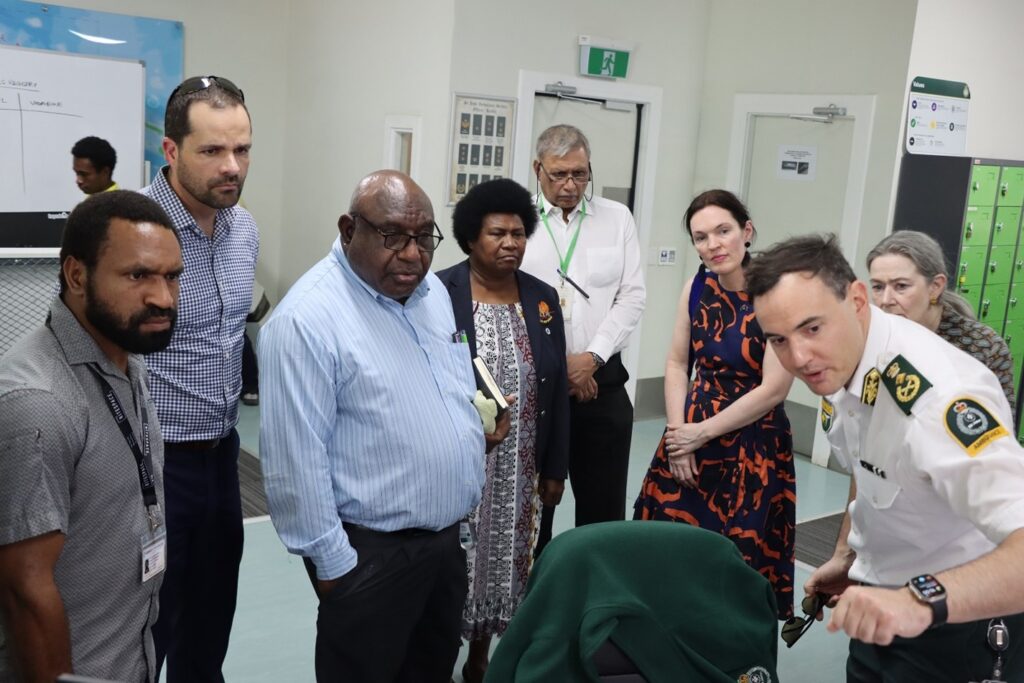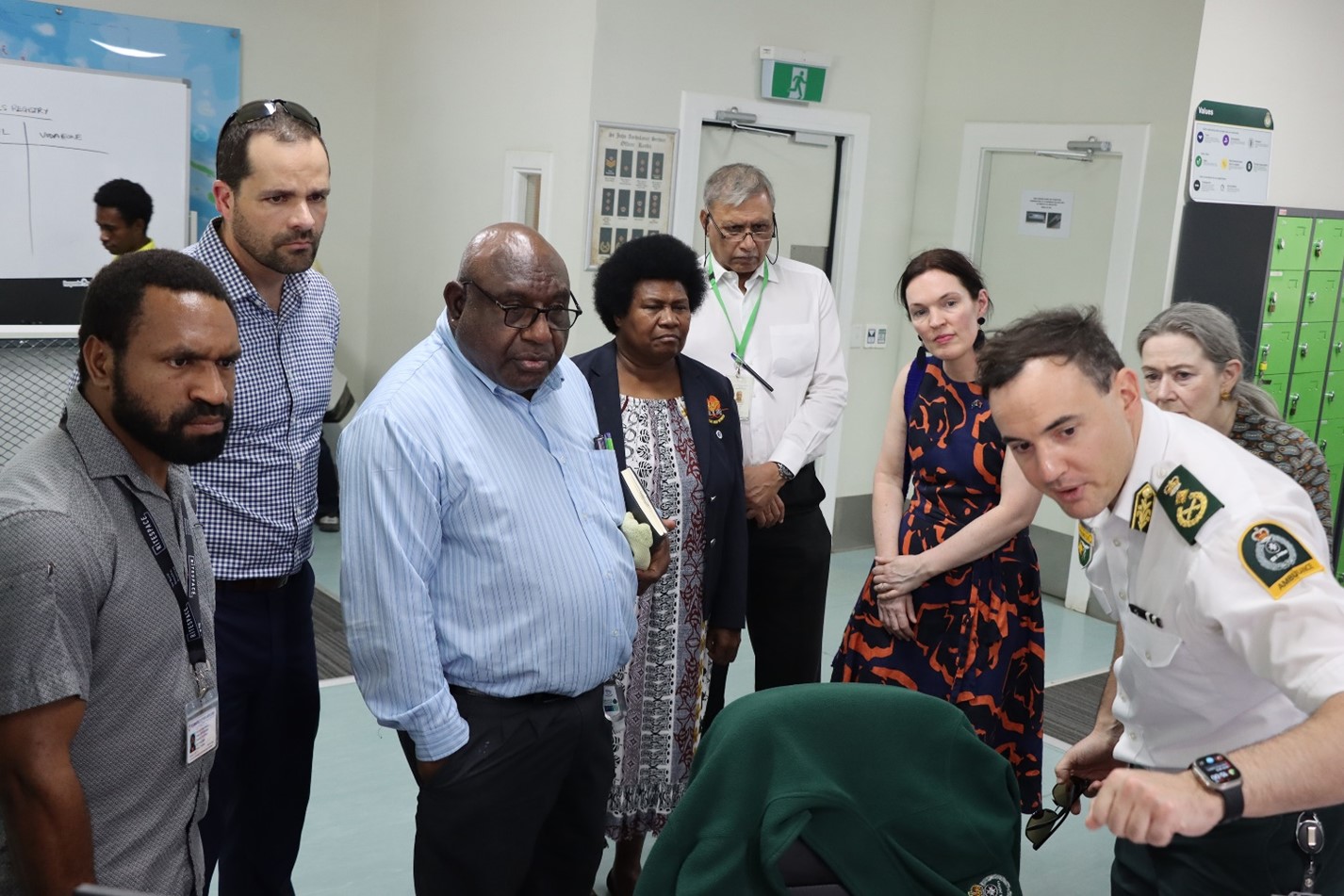Thursday 30 May 2024

CEO of the National St John Ambulance Service, Matt Canno (right), led a tour of the call center where emergency snakebite calls are received. The tour included Australian High Commission Counsellor for Health, Mirriam Carter, National Department of Health Secretary for National Health Standards and Compliance, Dr. Dora Lenturut-Katal, and other partners. The launch of the Australia-PNG Snakebite Partnership took place on Tuesday 28 May 2024. (credit: AHC Public Affairs)
Australia and Papua New Guinea have commenced a new phase of its PNG Snakebite Partnership.
The partnership will be implemented by St John Ambulance in collaboration with Commonwealth Serum Laboratories (CSL) / Seqirus Pty Ltd and the National Department of Health.
This follows five successful years of implementation by the Charles Campbell Toxinology Centre and the Australian Venom Research Unit (AVRU) of the University of Melbourne.
This initiative addresses the limited availability of snakebite antivenoms and reduces snakebite-related deaths in Papua New Guinea.
Since its establishment in 2018, the PNG Snakebite Partnership has saved over 2,000 lives and trained over 1,500 healthcare workers from 70 health facilities across 13 provinces in snakebite management.
The project has also supported the PNG Government in developing a sustainable antivenom supply capacity.
In a recent statement, Australia’s High Commissioner to PNG, John Feakes, expressed his delight at the continued support for the project.
“Australia is committed to supporting initiatives that save lives and improve health outcomes in Papua New Guinea,” said High Commissioner Feakes, whilst welcoming the renewal of this partnership, which continues to ensure access to antivenoms in PNG.
Deputy Health Secretary, National Health Standards and Compliance, Dr Dora Lenturut-Katal, admitted that snakebites are a serious public health issue, and improved supply and specialist training are saving lives.
Jules Bayliss, CSL Seqirus Medical Director, emphasised the critical role of timely antivenom access.
“We are proud to continue improving antivenom access in PNG, enabling doctors and nurses to deliver the best patient care.
Australia and PNG share many of the same venomous species, making us uniquely positioned to reduce the burden of snakebite in PNG.”
Matthew Cannon, CEO of St John Ambulance PNG, expressed enthusiasm for the partnership.
“We’re proud to join this lifesaving partnership and look forward to contributing our expertise in training healthcare workers and distributing lifesaving antivenoms, particularly in regional and remote areas.
“This partnership ensures that health centres across PNG have the knowledge and medicines to save lives well into the future.”
Andrew Maru, PNG Snakebite Partnership Nurse and Trainer, noted the partnership’s significant local impact. “The partnership has been instrumental in providing additional support and more antivenoms and improving our understanding of snakebite patient management.
“Continuing this partnership means we can train more people, deliver more antivenoms, and enhance the response to snakebites in PNG.”
About the Snakebite Partnership
• Since 2018, the project was managed in-country by the Charles Campbell Toxinology and the Centre Australian Venom Research Unit (AVRU) of the University of Melbourne. SJA have now taken over this implementation.
• The National St John Council of Papua New Guinea (SJA) have been awarded the new partnership through the PNG-Australia Transition to Health (PATH)) for the management of the implementation of the PNG Snakebite Partnership in partnership with the Commonwealth Serum Laboratories (CSL) /Seqirus Pty Ltd who donate to the PNG National Department of Health snakebite antivenoms (up to 600 annually) and the School of Medicine and Health Sciences, University of Papua New Guinea who provide a building space within their campus.
About CSL Seqirus
CSL Seqirus is part of CSL Limited (ASX: CSL). As one of the largest influenza vaccine providers in the world, CSL Seqirus is a major contributor to the prevention of influenza globally and a transcontinental partner in pandemic preparedness.
With state-of-the-art production facilities in the U.S., the U.K. and Australia, and leading R&D capabilities, CSL Seqirus utilizes egg, cell and adjuvant technologies to offer a broad portfolio of differentiated influenza vaccines in more than 20 countries around the world.
In Australia, CSL Seqirus operates the only local manufacturing facility for seasonal and pandemic influenza vaccine and produces a range of unique medicines in the national interest, including antivenoms and the world’s only human vaccine for Q fever.
The company also in-licenses a broad range of paediatric and adult vaccines and speciality pharmaceutical products.
About St Johns Ambulance
Every minute of every day, someone calls for help from the National St John. Their job is to bring order out of chaos, stabilise the victim and transport them to hospital. Each year, over 35,000 Papua New Guineans rely on help from the Ambulance Service.
The National St John is a statutory body that provides PNG’s vital emergency ambulance service reporting through the National Department of Health.
Despite receiving modest government support, it functions as a charity and is responsible for generating approximately 30 percent of the operating revenue toward the cost of providing the lifesaving ambulance service.

